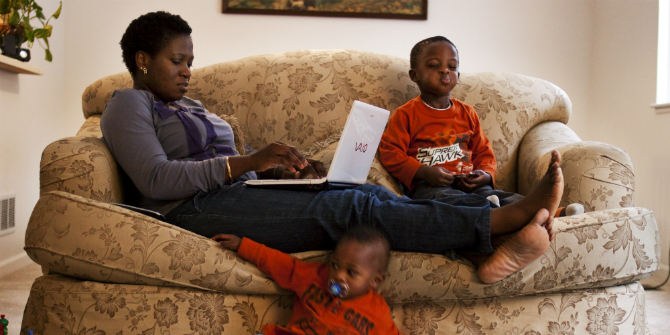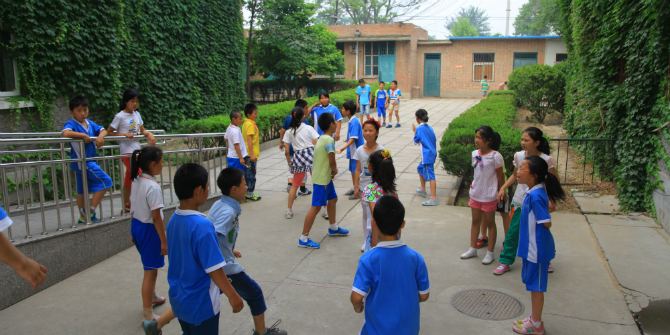 What do young people find harmful online? Is ‘cyberbullying’ an adequate and useful term to be using in our research? Anne Collier discusses findings from Global Kids Online research against University of New Hampshire’s Crimes Against Children Research Center‘s findings. Anne is executive director of national nonprofit organisation The Net Safety Collaborative (TNSC) and founder of its main project iCanHelpline.org, the U.S.’s social media helpline for schools. [Header image credit: E. Yourdon, CC BY-NC-SA 2.0]
What do young people find harmful online? Is ‘cyberbullying’ an adequate and useful term to be using in our research? Anne Collier discusses findings from Global Kids Online research against University of New Hampshire’s Crimes Against Children Research Center‘s findings. Anne is executive director of national nonprofit organisation The Net Safety Collaborative (TNSC) and founder of its main project iCanHelpline.org, the U.S.’s social media helpline for schools. [Header image credit: E. Yourdon, CC BY-NC-SA 2.0]
Even people under 18 would probably say we adults are getting smarter in the way we’re viewing cyberbullying (we could ask them [#stuvoice @stu_voice]!). That is, if they knew there’s growing consensus among researchers in many countries that ‘cyberbullying’ isn’t the most useful term for online hurtful behaviour and may be inhibiting what we can learn from young people about what’s harmful to them – that we need to find out from youth themselves what hurts them and to what degree it happens online.
The latest example of that, by Global Kids Online, spanned multiple countries – Argentina, Brazil, Bulgaria, Chile, Montenegro, the Philippines, Serbia and South Africa – with surveys of 9-17 year-olds in those countries.
What actually upsets them?
The researchers first asked them if they’d experienced “something upsetting” online in the past year before asking anything more specific, like “hurtful peer behavior” (“so as not to put ideas in their heads,” they write). Across all the countries, 14-36% had seen something upsetting, which could be anything from violence in news reports to harassment to sexually explicit content, depending on how each child’s defined “upsetting”. The number was much higher in Argentina (78%), but so were the respondents’ ages (13-17 only, not 9-17), suggesting a correlation between age and exposure to negativity.
Then young respondents were asked how upsetting the experience was, and, for example in Montenegro, of the 5% of 7-19 year-old Internet users who’d encountered something upsetting in those 12 months, 36% (of that 5%) were “fairly” or “very” upset by what they’d experienced.
The researchers then asked about hurtful peer behaviour both online and offline, to get a sense of the connection between online and offline harassment. Overall – online and offline –12-36% of 9-17 year-olds across all eight countries had experienced hurtful peer behaviour in the past year, while only 1-11% had experienced it online in the past year. This tracks with U.S. research, which has found that young people still experience more offline peer harassment than online (see this on research from our National Academies). As for what constitutes “hurtful behaviour,” the respondents were asked about everything from “nasty or hurtful messages” (aimed at themselves or someone else), feeling excluded or left out, being threatened, and having one’s personal information or password used by someone.
Similar questions here in the U.S.
This report reminds me of similar work done in 2015 at University of New Hampshire’s Crimes Against Children Research Center, which wanted to get at the impacts of online vs. offline harassment (and didn’t even use the term “cyberbullying”). The authors found that about a third (34%) of U.S. youth – in this study 10-20 year-olds – had experienced harassment of some kind over the previous year, 54% of it involving no technology, 15% involving technology only and 31% both in person and online. Contrary to what we all hear in the news so much, the negative emotional impact of online-only harassment is “significantly lower” than the in-person kind, the CCRC researchers found. The U.S. respondents found the harassment most distressful or hurtful when it was both offline and online.
It’s clear there’s still no consensus about either the definition or the value of the term “cyberbullying” – and, as the Global Kids Online authors write, the global confusion about it has been “exacerbated by mass media that generally promote alarming statistics without inquiring into definitions…”.
So we can be thankful that scholars keep questioning it. It seems to me Profs. Sameer Hinduja and Justin Patchin at the Cyberbullying Research Center use a term the public recognises in order to spread awareness of solid academic research on hurtful online behavior and its effects. They too have given careful thought to terminology – see this page in their site that pulls together a lot of thinking on the subject. Scroll down to “What is cyberbullying?” to zoom in where they, like Global Kids Online, say that adults’ terms and definitions may not be useful when talking with young people about what about their online experiences does – and doesn’t – hurt.
When they survey students, Patchin and Hinduja write, “we define cyberbullying in a way that we feel is more relevant to their everyday experiences. Specifically, we say that ‘cyberbullying is when someone repeatedly makes fun of another person online or repeatedly picks on another person through email or text message or when someone posts something online about another person that they don’t like.” And, as do the Global Kids Online researchers, “we also ask about specific behaviours that might constitute cyberbullying (such as: hurtful comments, threats, rumours, pictures, or videos posted or circulated online).”
So we’re making progress, and researchers are honouring a fundamental right of young people: to be consulted on issues that affect them.
Notes
This text was originally published on NetFamilyNews.org and has been re-posted with permission.
This post gives the views of the authors and does not represent the position of the LSE Parenting for a Digital Future blog, nor of the London School of Economics and Political Science.





